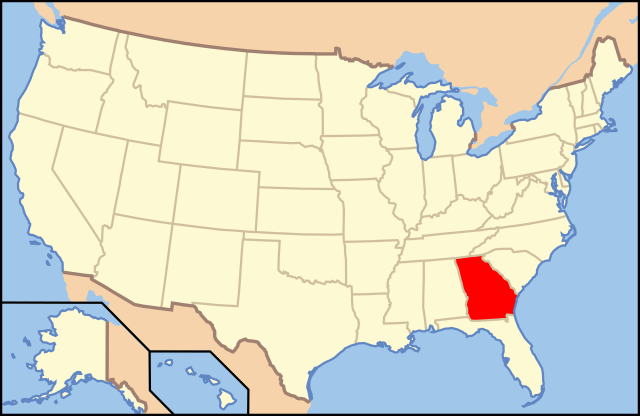The State of Georgia
AT A GLANCE
Name: Georgia was named for King George II of England.
Nicknames: Peach State, Empire State of the South
Capital: Atlanta
Size: 58,977 sq. mi.
Population: 10,214,860 (2015 est)
Statehood: Georgia became the fourth state on January 2, 1788.
Electoral votes: 15 (2016)
U.S. Representatives: 11 (until 2016)
State tree: live oak
State flower: Cherokee rose
State fish: largemouth bass
Highest point: Brasstown Bald, 4,784 ft.

THE PLACE
The northern half of Georgia is covered with high mountains that form part of the Appalachian chain, which extends through the eastern United States. Georgia's most fertile soil is in the Appalachian valleys, which makes them important agricultural regions. The land becomes increasingly flat as it stretches toward the Atlantic Ocean and Florida.
About 65 percent of the state is thickly forested, especially the mountainous regions. Georgia's climate is generally mild with warm, humid summers and short winters. Temperatures are cooler in the mountains. Some of Georgia's natural resources are its rivers, extensive forests, and many minerals, including clay, granite, and marble.
The statue of Abraham Lincoln in the Lincoln Memorial in Washington, D.C., was carved from Georgia's white marble.
Facts and Firsts
- Georgia is the largest state east of the Mississippi.
- Georgia produces more peanuts, pecans, and peaches than any other state.
- Vidalia onions, one of the sweetest types of onion in the world, are grown only in Vidalia and Glennville.
- The world's largest college campus is at Berry College in Rome.
- Dr. John S. Pemberton invented the soft drink Coca-Cola in Atlanta in May 1886.
- The Cherokee Phoenix, the nation's first known newspaper written in a Native American dialect, began publication in New Echota in 1828.
- In 1943, Georgia became the first state to allow 18-year-olds to vote.
THE PAST
Georgia's first inhabitants were Creek and Cherokee peoples. The first Europeans to explore the area were Spanish missionaries, who founded Santa Catalina in 1566. The British also claimed the region. James E. Oglethorpe founded the first permanent settlement in Georgia at Savannah in 1733. Georgia became a refuge for English debtors and victims of religious persecution. During the American Revolution, Georgians helped the American Continental army by raiding the British armory in Savannah and giving the weapons to the American revolutionaries.
After the war, Georgia became the fourth of the original thirteen colonies to ratify the U.S. Constitution and become a state. During the 1830s, Georgia expelled much of its Native American population.
In 1838, the last of the Cherokee Indians were forced to move to Indian Territory in Oklahoma in a cross-country march that became known as the Trail of Tears. During the Civil War, Georgia left the Union to fight as a southern state. Much of the state was damaged during William Tecumseh Sherman's famous March to the Sea, when the Civil War general and his men destroyed everything in their path from Atlanta to Savannah. After the Civil War, Georgia's economy began to expand. The cultivation of cotton, which had dominated the economy, began to decrease and production increased on a variety of crops including peaches and peanuts, and manufactured goods.
After slow economic growth at the beginning of the 20th century, Georgia became one of the most industrialized southern states. Following World War II, Georgia's industrial growth accelerated, and Atlanta became known as a commercial, financial, and cultural center for the Southeast. In 1996, Atlanta's progress was highlighted when the city hosted the Summer Olympic Games.
THE PRESENT
Before the Civil War, Georgia was famous for cotton produced on its many plantations, and agriculture remains an important part of the state's economy. In addition to peaches and pecans, Georgia farms grow large amounts of soybeans, tobacco, corn, and wheat. Tourism also contributes to the state's economy, as many tourists come to Georgia to visit the historic plantations, antebellum homes, and farms on the Antebellum Trail in the northeast part of the state.
Georgia is also a business-oriented state. Atlanta, the capital, is a center of trade, finance, and transportation. Many businesses, such as Coca-Cola, Georgia-Pacific, United Parcel Service, and Delta Air Lines have headquarters in Georgia.
Georgia has a strong manufacturing industry. Georgia produces more textiles than any other state except North Carolina, and the city of Dalton manufactures more carpet than any other city in the nation. Georgia also has many productive paper mills, and its factories build cars and aerospace equipment for the transportation industry.
Georgia is called the Empire State of the South because it is home to so many important industries.
Born in Georgia
- Conrad Aiken, poet
- Erskine Caldwell, writer
- James E. Carter, U.S. president
- Ray Charles, singer
- Ty Cobb, baseball player
- Ossie Davis, actor and writer
- James Dickey, poet, novelist
- Rebecca Latimer Felton, first woman appointed U.S. senator
- Oliver Hardy, comedian
- Harry James, trumpeter
- Jasper Johns, painter, sculptor
- Martin Luther King Jr., civil rights leader
- Juliette Gordon Low, U.S. Girl Scouts founder
- Carson McCullers, novelist
- Johnny Mercer, songwriter
- Margaret Mitchell, novelist
- Elijah Muhammad, black nationalist, religious leader
- Jessye Norman, soprano
- (Mary) Flannery O'Connor, author
- Osceola, Seminole leader
- Jackie Robinson, baseball player
- Clarence Thomas, jurist
- Alice Walker, author